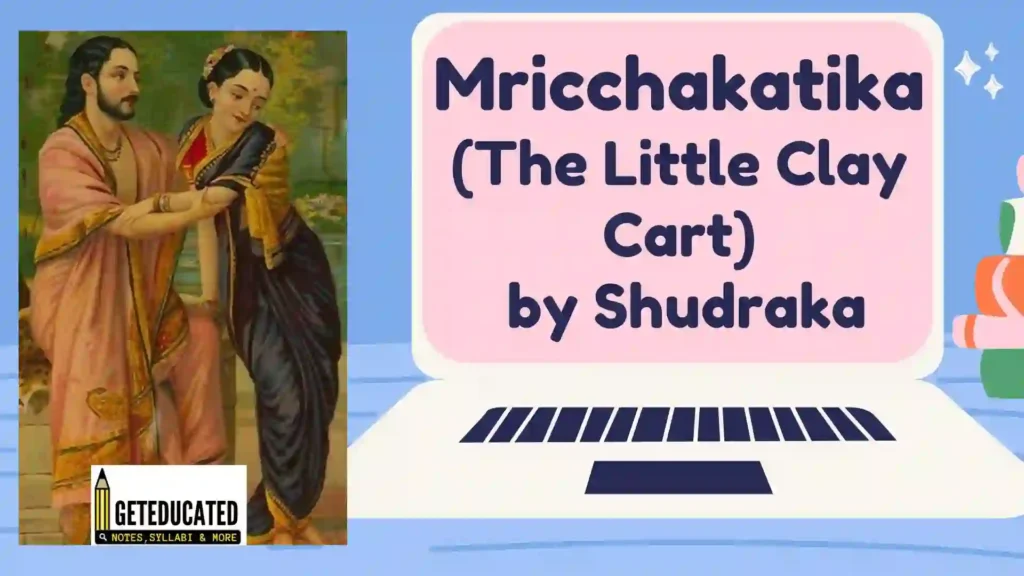
Society in Mricchakatika is reflected in different aspects, primarily because the play is essentially a Prakarana. In a Prakarana, the story concentrates on experiences of the commonmen. It is a sub-genre of drama which derives its theme fromissues of society and lives of ordinary men. In his play, Mricchakatika, Sudrakashows the troubles, flavours and joys of the people of Ujjain.
Through the progress of the plot, the audience gains an understanding of class hierarchies and divisions in Indian society. Society in Mricchakatika has representations from different classes andeconomicstrata. Royal persons and their relatives enjoyed special treatment, even when they were corrupt and without any merit. The system of slavery was prevalent where men were sold and bought like cattle or commodities. Brahmins enjoyed high social reverence in society but were often greedy and corrupt. Charudatta’s poverty was the reason for his loneliness. This shows that, just like today’s society, the society in Mricchakatika was also a selfish, corrupt and materialistic one.
In some ways, however, this society was different from our society. Prostitution was treated as a socially validated profession. The prostitutes were often well trained in music, dance and art of sexual service. Both married and single men had mistresses without being secretive about it. However, society never allowed courtesans any right of ancestry or property. This is understood when we see that Vasantasena’s wealth is centred around her jewellery, not any land or
other object. She is aware of Charudatta’s love for her. However, she is also aware of her inability to own him. Her maternal love for Rohasena, her need to transfer her wealth to his clay cart, is born out of this sense of loss. Her children could never be legitimate heir to Charudatta. No matter how much gold she had, she was poorer than Rohasena’s mother in terms of social standing.
On the other hand, Charudatta’s wife represents an equally powerless position of women, so far as society in Mricchakatika is concerned. She has the rightful claim on Charudatta but she has no identity of her own. In this, she is inferior to Vasantasena, who is an independent woman, exercising choice in love life. The monetary action by Charudatta illuminates us about role of money in relationships. It was the duty of man to give money and riches to his wife. Therefore, when woman offers money to her husband, the entire dynamics of the relationship is reversed. Charudatta says, “Through money, a man becomes a woman”.
Gambling, like prostitution, was also a legal thing in society. The play Mricchakatika shows characters like thieves, slaves and ever shampooers. The conversion of the petty minded shampooer to a monk shows the impact of Buddhism on society. The subplots and backdrop supply valuable detailing to the main story of Charudatta and Vasantasena. Several interwoven subplots, representing the contemporary society, involving a tyrannical king, an over-bearing brother-in-law of the king, the political unrest and revolution, add flavour to the play.
It is, therefore, a variety of issues, drawn from every class and gender of society, that makes Mricchakatika stand out as a unique Sanskrit play. The characters are living men and women, rooted in a conventional society. Sudraka draws on a variety of classes, ranging from the Brahmins to the executioner and the housemaid. He presents different layers of society as an admixture of good and bad. The play Mricchakatika offers a profound understanding of the age and reflect the private fears, insecurities, joys and hopes of people living in that society.

[…] Society in Mricchakatika is reflected in different aspects, primarily because the play is essentially a Prakarana. In a Prakarana, the story concentrates on experiences of the commonmen. It is a sub-genre of drama which derives its theme fromissues of society and lives of ordinary men. In his play, Mricchakatika, Sudrakashows the troubles, flavours and joys of the people of Ujjain. … (Read More) […]